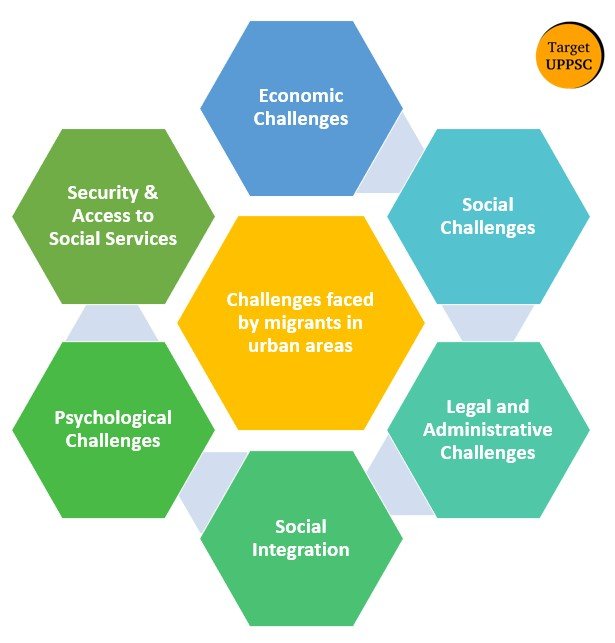As Safety, shelter, basic services, and livelihood prospects appear more promising in cities; therefore Conflict, environmental degradation, climate change, poverty, and spatial inequalities drive individuals toward urban areas.
Migrants in urban areas face a variety of challenges that can significantly impact their quality of life and opportunities for upward mobility. These challenges are often multifaceted and interconnected, affecting their economic, social, and psychological well-being. Here are some of the primary challenges:
Economic Challenges
Employment:
-
- Informal Sector Jobs: Many migrants find work in the informal sector, which is characterized by low wages, lack of job security, and poor working conditions.
- Exploitation and Discrimination: Migrants often face exploitation by employers, including wage theft, discrimination, and hazardous working environments.
Housing:
-
- Affordable Housing: Access to affordable and decent housing is a major issue. Migrants often live in overcrowded and substandard conditions, such as slums and informal settlements.
- Evictions: They are frequently at risk of forced evictions, which can disrupt their lives and livelihoods.
Social Challenges
Health and Sanitation:
-
- Access to Healthcare: Migrants often have limited access to healthcare services due to cost, lack of documentation, or discrimination.
- Sanitation: Poor living conditions and overcrowded housing can lead to inadequate sanitation facilities, increasing the risk of communicable diseases.
Education:
-
- Children’s Education: Migrant children face barriers to accessing quality education, including language barriers, discrimination, and frequent relocations.
Legal and Administrative Challenges
Documentation:
-
- Lack of Legal Documentation: Many migrants do not have the necessary legal documentation, which restricts their access to formal employment, social services, and legal protections.
- Complex Bureaucracy: Navigating the complex bureaucracy to obtain necessary permits and documentation can be daunting and time-consuming.
Social Integration
Discrimination and Xenophobia:
-
- Social Exclusion: Migrants often face social exclusion and discrimination from the local population, which can lead to a sense of isolation and marginalization.
- Cultural Barriers: Differences in language, culture, and customs can hinder social integration and access to community networks.
Identity and Belonging:
-
- Cultural Adjustment: Adjusting to the new cultural environment can be challenging, and migrants may struggle with maintaining their cultural identity while integrating into the urban society.
Psychological Challenges
Stress and Mental Health:
-
- Stress: The stress of adapting to a new environment, coupled with economic and social pressures, can negatively impact mental health.
- Mental Health Services: Limited access to mental health services exacerbates the challenges faced by migrants, leading to untreated mental health issues.
Security
Vulnerability to Crime:
-
- Criminal Exploitation: Migrants are often more vulnerable to crime, including human trafficking, forced labour, and other forms of exploitation.
Access to Social Services
Welfare and Support Services:
-
- Exclusion from Social Programs: Many social welfare programs are not accessible to migrants due to legal or bureaucratic barriers, leaving them without a safety net.
Solutions and Preparedness:
-
- Data Collection: Collecting migrant data informs better urban planning.
- Multi-stakeholder Approach: Involving local government, media, migrant communities, international organizations, civil society, and the private sector.
- Inclusive Urban Planning: Catering to long-term needs of migrants.
- Responsive City Leadership: Outward-looking and action-oriented leadership is crucial.
- collaboration and proactive measures from all stakeholders.
Conclusion
The challenges faced by migrants in urban areas are complex and interrelated, requiring comprehensive policy responses and targeted interventions. Addressing these challenges involves improving access to affordable housing, healthcare, education, and legal services, while also promoting social integration and protecting the rights of migrants. Collaborative efforts from government agencies, non-governmental organizations, and the community are essential to creating an inclusive urban environment where migrants can thrive.


